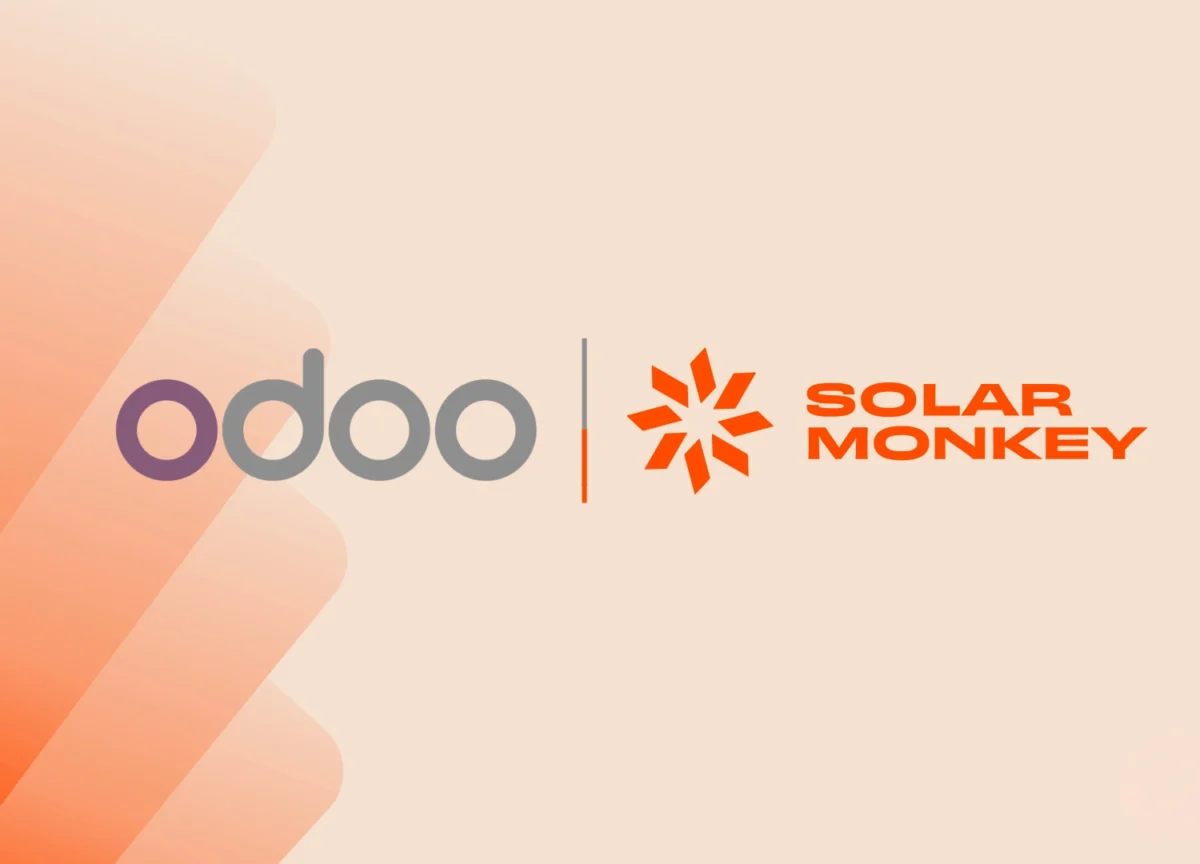As Solar Monkey, we have a clear focus: we want to be the very best calculation and quotation tool for installers of energy products. We consciously choose this niche because that focus helps us excel in that specific area. However, the process for an installer is much broader, and the demand for complete process optimization is often brought to us. We have a lot of experience with this as well. Below is a selection of possible CRM and ERP systems and our perspective on them.
Which software fits your installation company?
We have evaluated all systems based on what we see as the most important elements. In the table below, you’ll find our scores and conclusions. After that, we will delve into the different software products for further information.
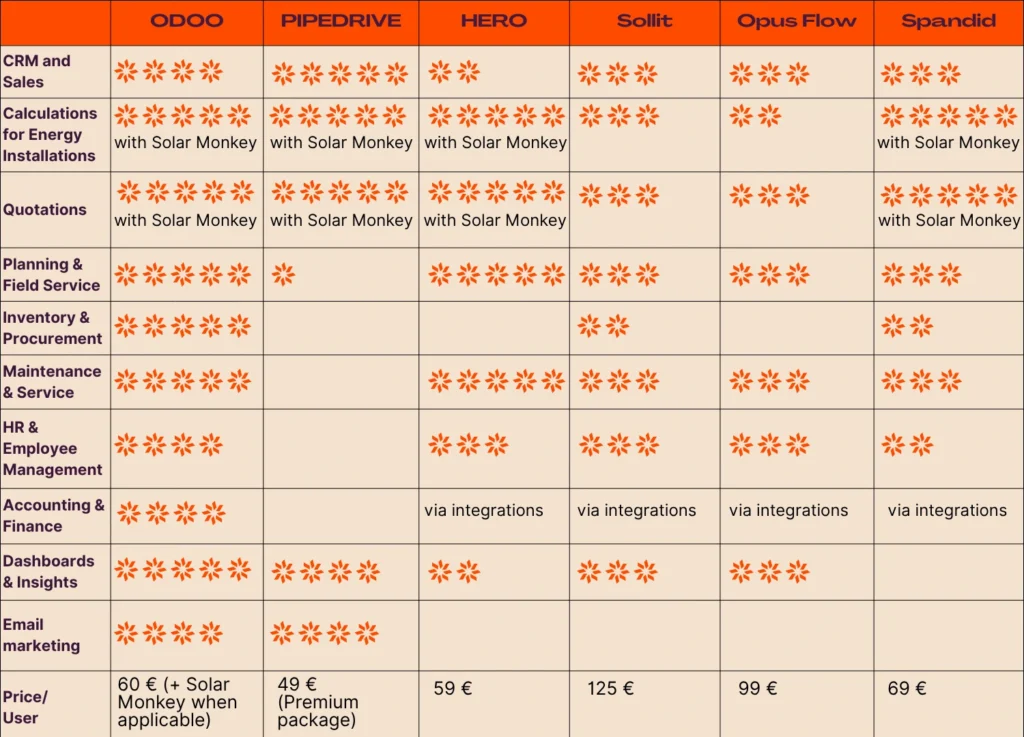
So which one is the best? Well, that’s not easy to say. It depends on what exactly you want to achieve. We see it as follows:
- Odoo: A complete all-in-one ERP and CRM, modular and scalable. Ideal for companies that want to manage sales, planning, quotations, and administration in one system. Because it is so extensive, it is probably overkill for organizations with fewer than 5 employees.
- Pipedrive: Ideal if you are primarily looking for a CRM for sales, without ERP functionality. Optionally supplemented with a form app for inspection and handover forms. Planning is then simply done in calendars (like Google or Outlook).
- HERO: Suitable for installation companies that want an industry-specific ERP system, strong in work orders and field service. Especially if you value the sales process less but primarily want your field service to work quickly and conveniently.
- Sollit: A simple ERP system with a good workflow, specifically for the sustainable installer. This is handy if you are looking for all-in-one software for the installer that meets all basic components but doesn’t have extensive requirements.
- Opus Flow: Actually very similar to Sollit. It feels a bit more modern and user-friendly than Sollit. Logical, as it is also a younger company. The downside is that the design and calculation functionalities of the various energy products are subpar.
- Splandid: Also a fairly complete ERP solution, specifically for installers. Easy to use, suitable for small to medium-sized installation companies.
Hi, I am Jan Pieter, CEO of Solar Monkey. Using the button below, you can schedule an appointment with me. Together, we will determine which integration best suits your needs.
Jan Pieter Versluijs

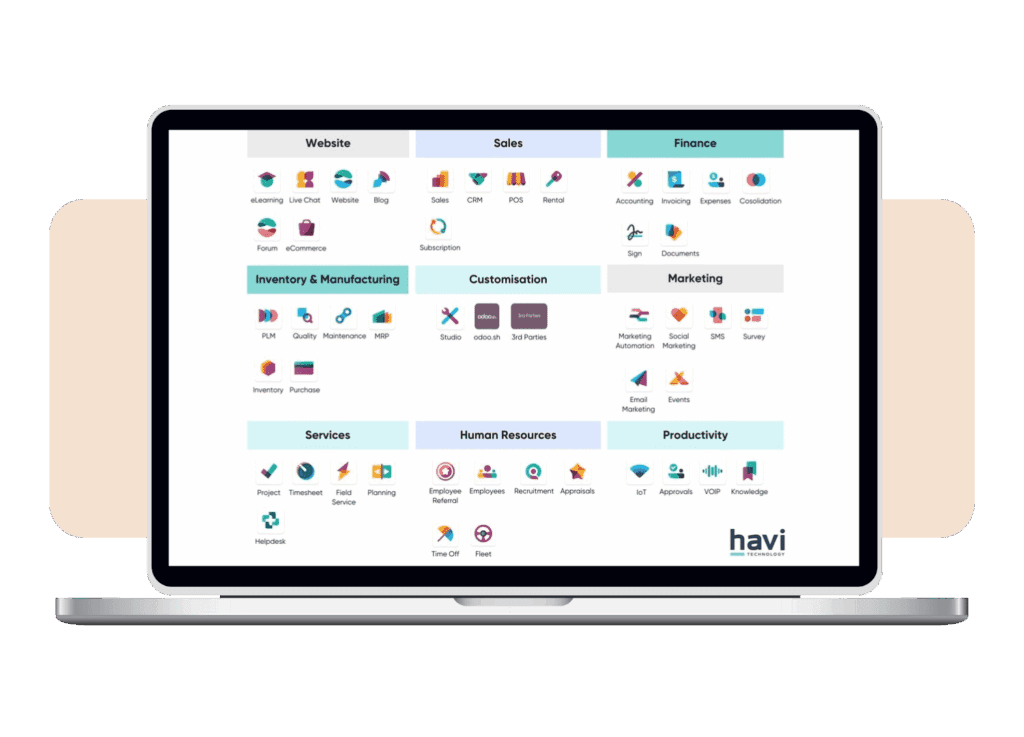
Odoo
Odoo is a modular ERP and CRM platform that offers everything in one: from sales and customer management to planning, inventory, and administration. This makes Odoo incredibly powerful for organizations with ambitions to digitize and optimize their entire workflow. The number of possibilities can be overwhelming, making implementation complex and costly. To address this, Solar Monkey, together with its Odoo partner, has developed a version specifically for installers of energy installations. With this, you have a ‘plug and play’ version that perfectly matches what you need. From that starting version, you can further personalize if desired.
Read our article with more information about Odoo here.
Advantages:
- All-in-one solution: CRM, marketing, planning, work orders, inventory management, invoicing, and HR.
- Very comprehensive in functionality. It essentially includes everything you need. And because it’s open source, you can continue to develop it further to your heart’s content.
- All steps in your business process can be automated and optimized.
- Modular: you can start small and expand later.
- Very competitively priced. Only €60 per user per month for the full suite. This makes it not only the most complete but also one of the most affordable options.
Disadvantages:
- Implementation can be complex due to the wide variety of options. We address this with the standard setup we have developed. We’ve already done the hard work for you.
- Potentially more features than a small company needs.
Curious to find out more?
Pipedrive
Pipedrive is a user-friendly CRM solution that focuses on sales and customer management. It helps companies manage their sales pipelines clearly and automate follow-ups, making it a very powerful CRM for selling more. However, if you’re looking to fully optimize your workflow through planning and work orders, you might encounter limitations.
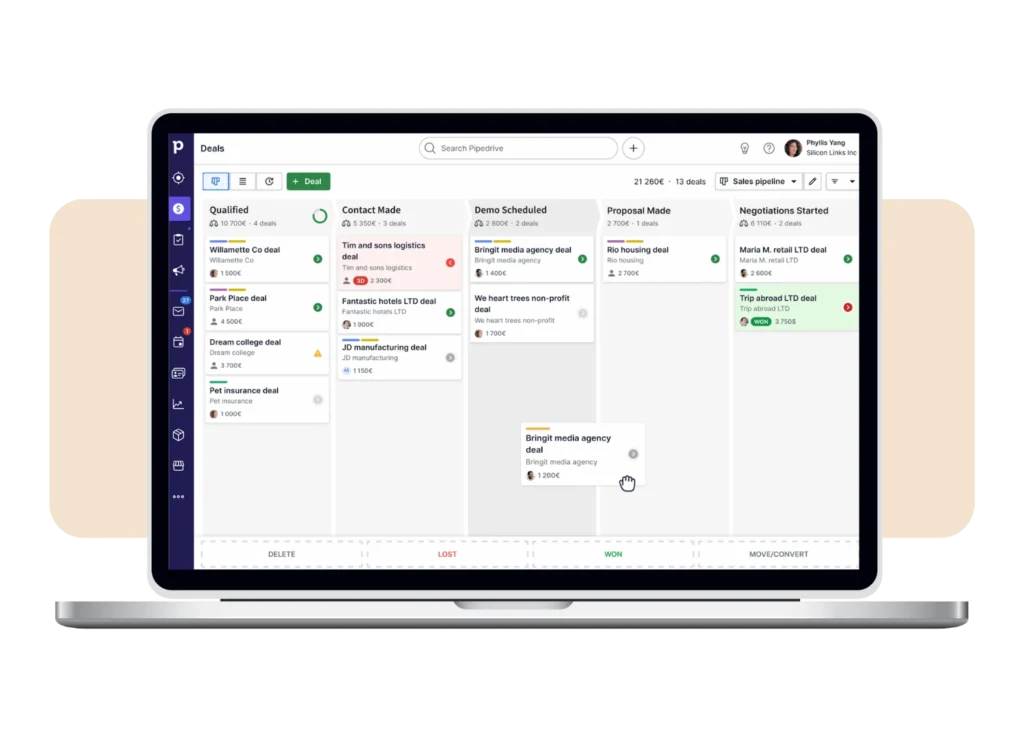
Advantages:
- Strong in sales pipeline management and lead follow-up.
- Very user-friendly and quick to set up.
- Automations for emails and reminders.
- Affordable and suitable for small businesses.
- Integrated with Solar Monkey for a smooth workflow.
Disadvantages:
- No ERP functionality (planning, inventory, work orders, and invoicing are missing). This can be partially addressed by integrating with tools like Moreapp, but it is never as comprehensive as true ERP systems like Odoo or Zoho.
Curious to find out more?

HERO
HERO is an industry-focused ERP system for installation and construction companies, with an emphasis on field service, work orders, and project planning. This is highly effective if you primarily want to manage your field service well, as it can be efficiently directed through the native app, and completed work can be well-documented. Unfortunately, HERO is somewhat weaker in the area of CRM and sales.
Advantages:
- Specially developed for installation and construction companies.
- Strong in work orders, scheduling, time tracking, and field service app.
- Integrated with Solar Monkey, both at the project and product levels.
Disadvantages:
- Less advanced in CRM and sales automation.
Curious to find out more?
Sollit
Sollit is a well-known ERP system that supports the workflows and processes of installation companies, from planning to service. It promotes itself as an all-in-one tool specifically for the installation industry. This is also where its strength lies: you can manage everything within it, from leads to quotations and project completion. However, this is also its weakness: because it is so broad yet operates within a niche, you might encounter limitations in specific components. For instance, we’ve often heard that the design and calculation module does not perform exceptionally well, and that CRM and ERP are somewhat more limited compared to well-known packages like Zoho, Salesforce, and Odoo.
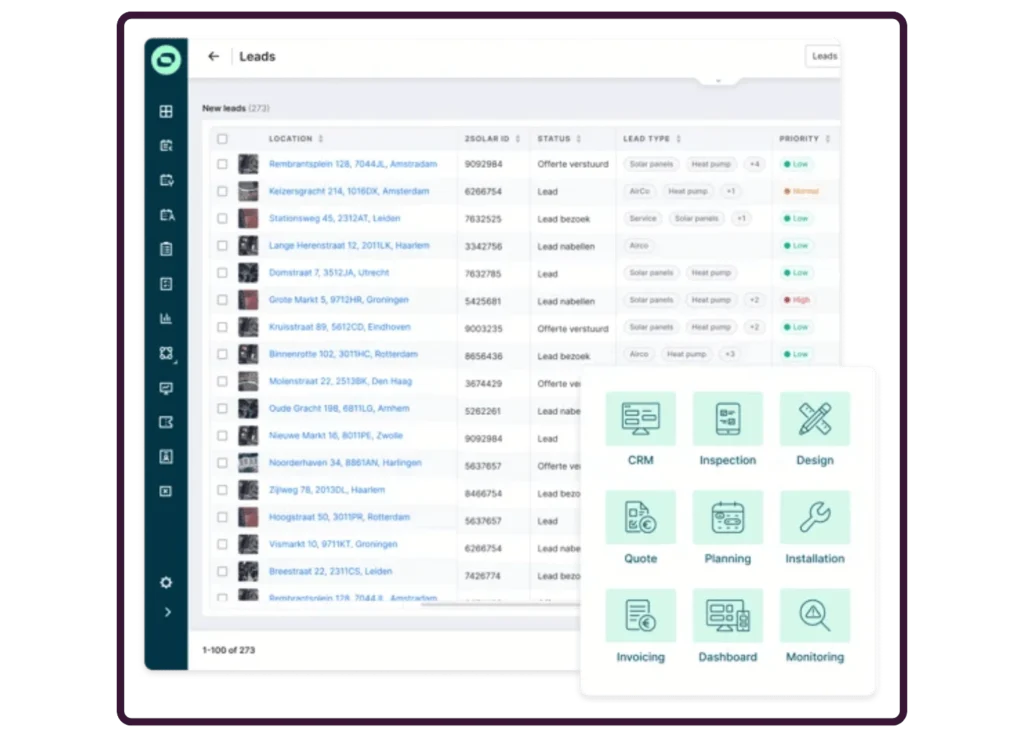
Advantages:
- Focused on installation companies, with recognizable workflows.
- Covers the entire process from lead to invoicing.
- Maintenance contracts and service are easy to manage.
Disadvantages:
- Although it is “all-in-one,” its functionality is not nearly as extensive as Odoo or Zoho.
- Opaque pricing. Often additional costs for personalization and expansions.
- No integration with Solar Monkey. A more limited calculation tool.
- CRM and marketing functionalities are less extensive than dedicated systems.
Curious to find out more?
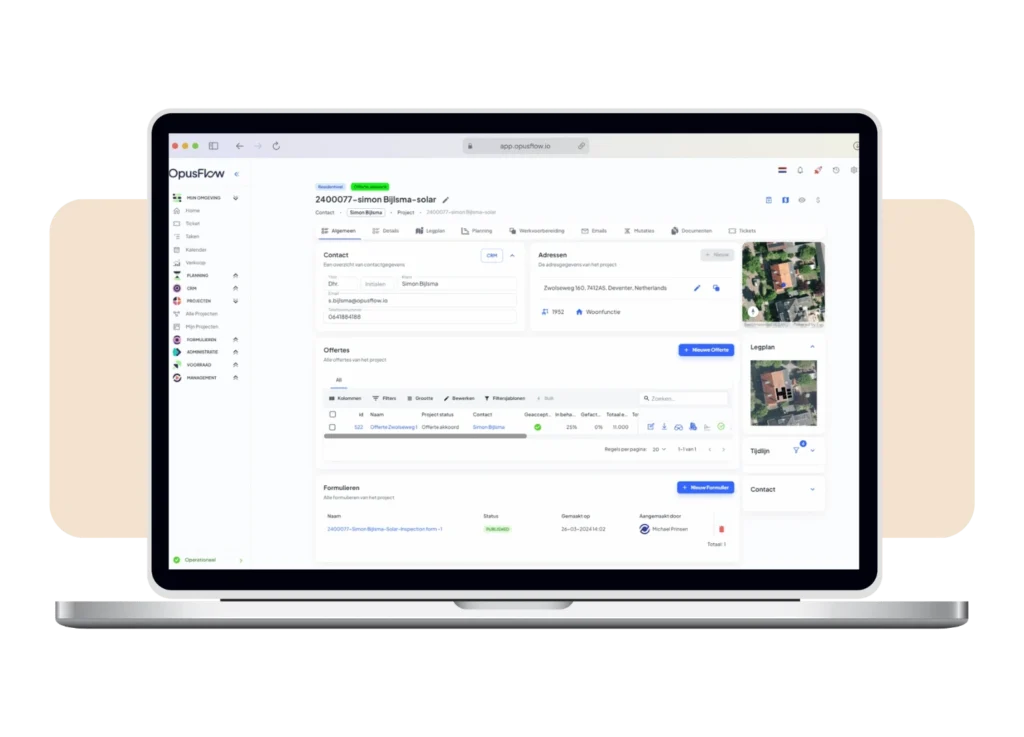
Opus Flow
Opus Flow is a CRM and workflow software tailored for solar energy and installation companies. The software is very similar to Sollit but feels somewhat more modern and user-friendly. At the same time, the software is still relatively new, which is reflected in numerous reports of somewhat buggy software. The CRM and ERP functionalities, particularly the automations, are slightly better than Sollit’s. Unfortunately, the calculation tools are really subpar, and the lack of integration with Solar Monkey is a missed opportunity.
Advantages:
- Focused on installation companies, with recognizable workflows.
- Covers the entire process from lead to invoicing.
- Interface is often perceived as more user-friendly than Sollit.
- Clear and transparent pricing.
Disadvantages:
- The calculation tool is even more limited than Sollit’s and is actually insufficient. The lack of integration capability with Solar Monkey is unfortunate.
- Like Sollit: the CRM and ERP capabilities are suitable for many companies but are more limited compared to larger, well-known packages like Odoo, Zoho, and Salesforce.
Curious to find out more?
Splandid
Splandid is a Dutch ERP system specifically designed for installers. They are making significant strides to become a strong contender against Sollit and Opus Flow. The major advantage of Splandid compared to Opus Flow and Sollit is the possibility of integration with Solar Monkey.
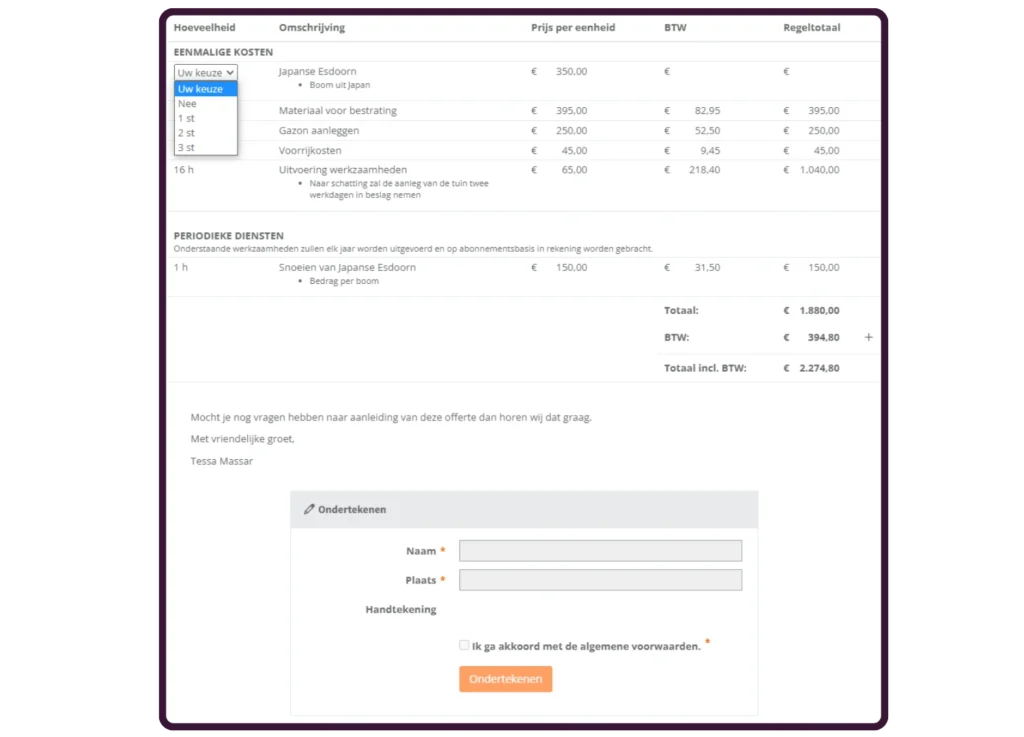
Advantages:
- Good balance between ERP and CRM, specifically for installation companies.
- Strong in planning, work orders, and technicians’ scheduling.
- User-friendly interface and relatively easy to set up.
- Fully integrated with Solar Monkey, at both the project and product levels.
- Particularly strong for smaller installers.
Disadvantages:
- Not as extensive as systems like Odoo or Zoho.
- No integration with Outlook or Google Calendar, as the calendar is entirely in-app.
Curious to find out more?
Hi, I am Jan Pieter, CEO of Solar Monkey. Using the button below, you can schedule an appointment with me. Together, we will determine which integration best suits your needs.
Jan Pieter Versluijs

FAQ
CRM focuses on customer management and sales. ERP also includes planning, inventory management, work orders, HR, and accounting.
Pipedrive if you want a focus on sales
Hero if you mainly want to organize your field service
Opus Flow, Splandid, or Sollit if you prefer an all-in-one solution
For large installation companies, you need a tool that can grow with your functional requirements. For this, we recommend Odoo or Zoho. Both cover the entire process from lead generation to accounting. They are globally recognized systems and highly developed, ensuring that your needs are met. Moreover, both are competitively priced.



